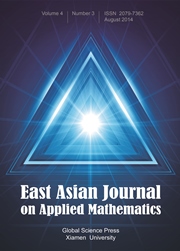Crossref Citations
This article has been cited by the following publications. This list is generated based on data provided by Crossref.
Hua, Yuchun
Tang, Yuelong
and
Greco, Leopoldo
2022.
Superconvergence of Semidiscrete Splitting Positive Definite Mixed Finite Elements for Hyperbolic Optimal Control Problems.
Advances in Mathematical Physics,
Vol. 2022,
Issue. ,
p.
1.
Zhang, Xindan
Zhao, Jianping
and
Hou, Yanren
2023.
A priori error estimates of Crank-Nicolson finite element method for parabolic optimal control problems.
Computers & Mathematics with Applications,
Vol. 144,
Issue. ,
p.
274.
Zhang, Xindan
Zhao, Jianping
and
Hou, Yanren
2025.
Finite element error estimation for parabolic optimal control problems with time delay.
Applied Numerical Mathematics,
Vol. 212,
Issue. ,
p.
176.

